
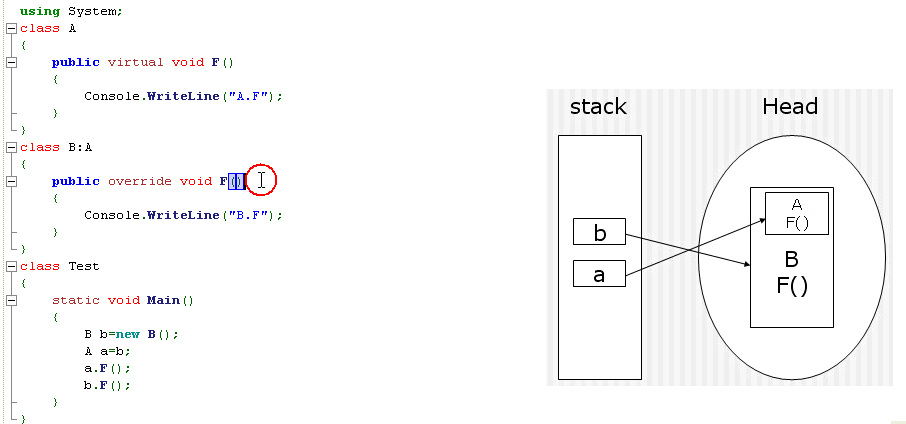

Note: virtual 和 abstract 方法不能声明为 private。

1 using System; 2 using System.Collections.Generic; 3 using System.Linq; 4 using System.Text; 5 using System.Threading.Tasks; 6 using System.Collections; 7 8 namespace ConsoleApplication1 9 { 10 11 class Employee 12 { 13 private string _name; 14 15 public Employee(string name) 16 { 17 this._name = name; 18 } 19 20 public string Name 21 { 22 get 23 { 24 return this._name; 25 } 26 } 27 28 public virtual void startWork() 29 { 30 Console.WriteLine("{0} starts work.", this._name); 31 } 32 } 33 34 class Manager : Employee 35 { 36 public Manager(string name): base(name) 37 { 38 39 } 40 41 public override void startWork() 42 { 43 Console.WriteLine("{0} starts to distrubit tasks", base.Name); 44 } 45 } 46 47 class Secretary : Employee 48 { 49 public Secretary(string name) 50 : base(name) 51 { 52 53 } 54 55 public override void startWork() 56 { 57 Console.WriteLine("{0} starts to help", base.Name); 58 } 59 } 60 61 class Seller : Employee 62 { 63 public Seller(string name) 64 : base(name) 65 { 66 67 } 68 69 public override void startWork() 70 { 71 Console.WriteLine("{0} starts to sell", base.Name); 72 } 73 } 74 75 class Accountant : Employee 76 { 77 public Accountant(string name) 78 : base(name) 79 { 80 81 } 82 83 public override void startWork() 84 { 85 Console.WriteLine("{0} starts to compute", base.Name); 86 } 87 } 88 89 class Program 90 { 91 static void Main(string[] args) 92 { 93 Employee[] es = new Employee[5]; 94 95 es[0] = new Employee("Tim"); 96 es[1] = new Manager("Gan"); 97 es[2] = new Secretary("Kate"); 98 es[3] = new Seller("Jim"); 99 es[4] = new Accountant("Tata"); 100 101 foreach(Employee e in es) 102 { 103 e.startWork(); 104 } 105 106 Console.ReadKey(); 107 } 108 } 109 }
抽象方法:
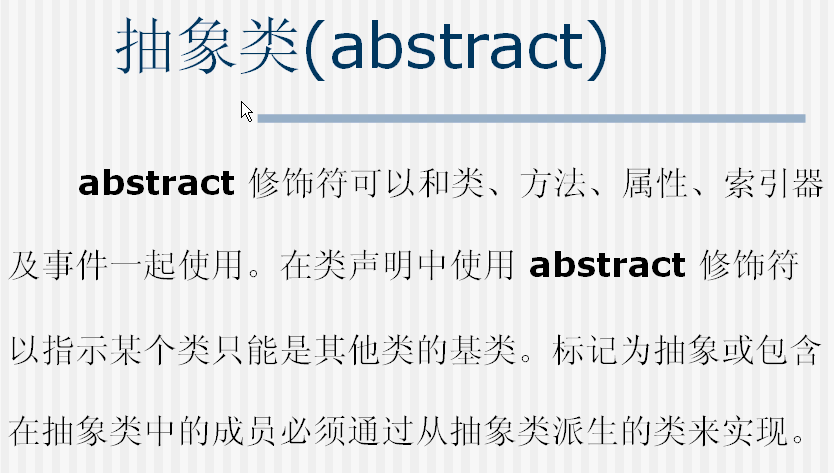
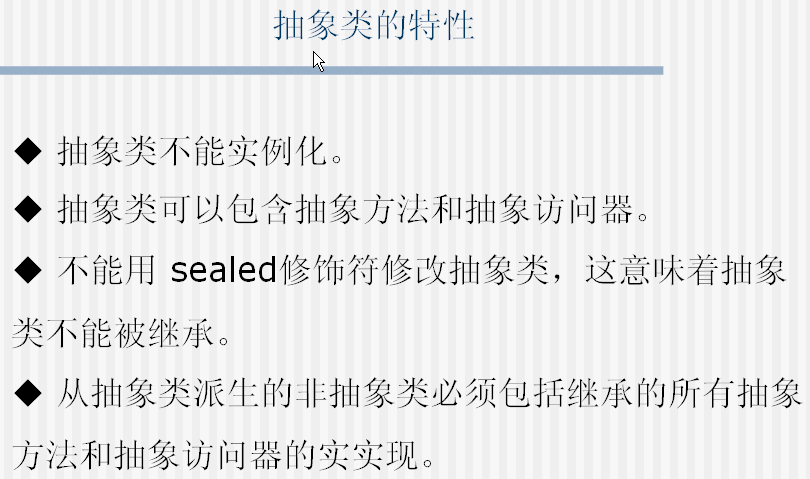
抽象方法本身就是一个隐含的virtual虚方法,也可以实现多态。抽象方法必须声明在抽象类中。抽象方法不能声明为private。

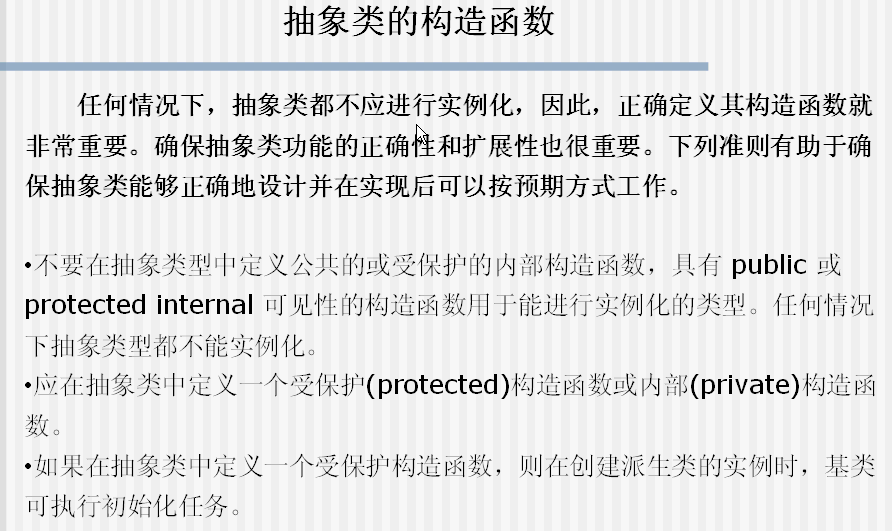

using System; using System.Collections.Generic; using System.Linq; using System.Text; using System.Threading.Tasks; using System.Collections; namespace ConsoleApplication1 { abstract class Employee { private string _name; protected Employee(string name) { this._name = name; } public string Name { get { return this._name; } } public abstract void startWork(); } class Manager : Employee { public Manager(string name) : base(name) { } public override void startWork() { Console.WriteLine("{0} starts to distrubit tasks", base.Name); } } class Secretary : Employee { public Secretary(string name) : base(name) { } public override void startWork() { Console.WriteLine("{0} starts to help", base.Name); } } class Seller : Employee { public Seller(string name) : base(name) { } public override void startWork() { Console.WriteLine("{0} starts to sell", base.Name); } } class Accountant : Employee { public Accountant(string name) : base(name) { } public override void startWork() { Console.WriteLine("{0} starts to compute", base.Name); } } class Program { static void Main(string[] args) { Employee[] es = new Employee[5]; es[0] = new Manager("YY"); es[1] = new Manager("Gan"); es[2] = new Secretary("Kate"); es[3] = new Seller("Jim"); es[4] = new Accountant("Tata"); foreach (Employee e in es) { e.startWork(); } Console.ReadKey(); } } }
虚方法和抽象方法:
当所有子类都要实现一些共同的功能的时候,应用虚方法。
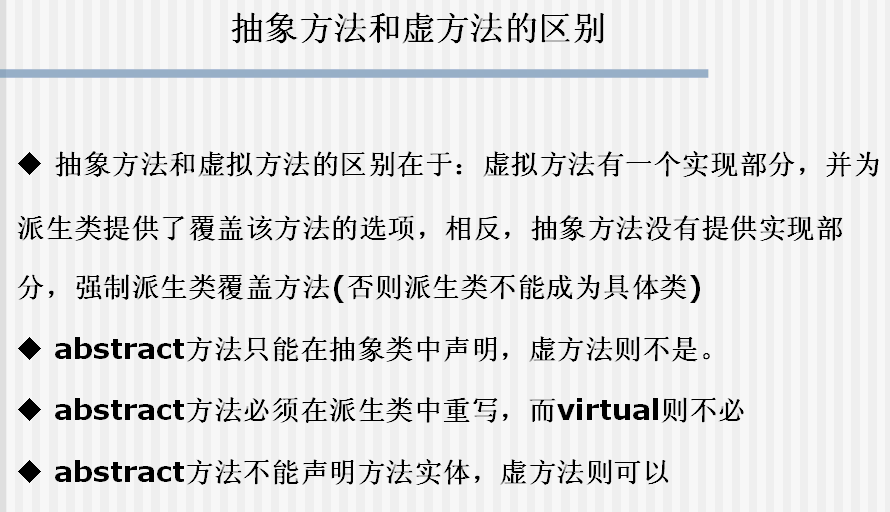
包含抽象方法的类不能被实例化,而包含virtual的类则可以。
